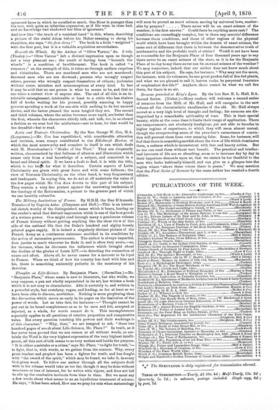Thoughts on Life - Science. By Benjamin Place. (Macmillan.)—Mr. "Benjamin Place," whose
name is new to literature, but who wields, we may suppose, a pen not wholly unpractised in its art, has written a book which it is not easy to characterize. Able it certainly is, and written in a powerful style, but crotchety, vague, and leading, as far at least as we have been able to discern, nowhither. Nothing is more perplexing than the discussion which meets us early in its pages on the limitation of the power of words. Let us take this, for instance :—" Thought cannot be put out in its broad completeness so as to be seen and felt, accepted or rejected, as a whole, for words cannot do it. This incompleteness especially applies to all questions of relative proportion and comparative value. But every question touching life powers and their workings is of this character.' "Why, then," we are tempted to ask, "these two hundred pages of words about Life-Science, Mr. Place ?" In truth, as it has never been proved that we can reason at all without words, as cer- tainly the Word is the very highest expression of the very highest intelli- gence, all this sort of talk seems to ns very useless and beside the purpose. "It is either a mistake or a crime," says Mr. Place, "to fight for truth,"— to fight, that is, with words, as we gather from the context. Why, every great teacher and prophet has been a fighter for truth, and has fought with "the sword of the spirit," which may be found, we take it, in every God-given word. To follow our author through all the subjects dealt with in his volume would take us too far, though it may be done without weariness or loss of interest, for he writes with vigour, and does not fail to stir up the combative instincts from time to time. But we must say a few words about what seems to us an injudicious treatment of science. Be says, "It has been asked, How can we pray for rain when meteorology
will soon be proved an exact science, moving by universal laws, unalter-
able by prayers? There never will be an exact science of the weather, is the first answer." Could there be anything more rash? The conditions are exceedingly complex, but is there any essential difference between these conditions, and those of other regions of the physical world which have been brought within the domain of exact science, the same sort of difference that there is between the demonstrative truth of mathematics and the probable truth of ethics ? Would it not have been as reasonable for the Benjamin Place of four thousand years ago to say there never be an exact science of the stars, as it is for the Benjamin Place of to-day to say there never can be an exact science of the weather? We may conjecture, indeed, that our author does not know much about this part of his subject. He says, for instance, "Why may not the moon, for instance, with its volcanoes, be one great garden full of fire-fed plants, and what we are pleased to call it, barren rocks, be perpetual fountains of resplendent fire-life ?" Anyhow, there cannot be what we call fire there, for there is no air.


































 Previous page
Previous page